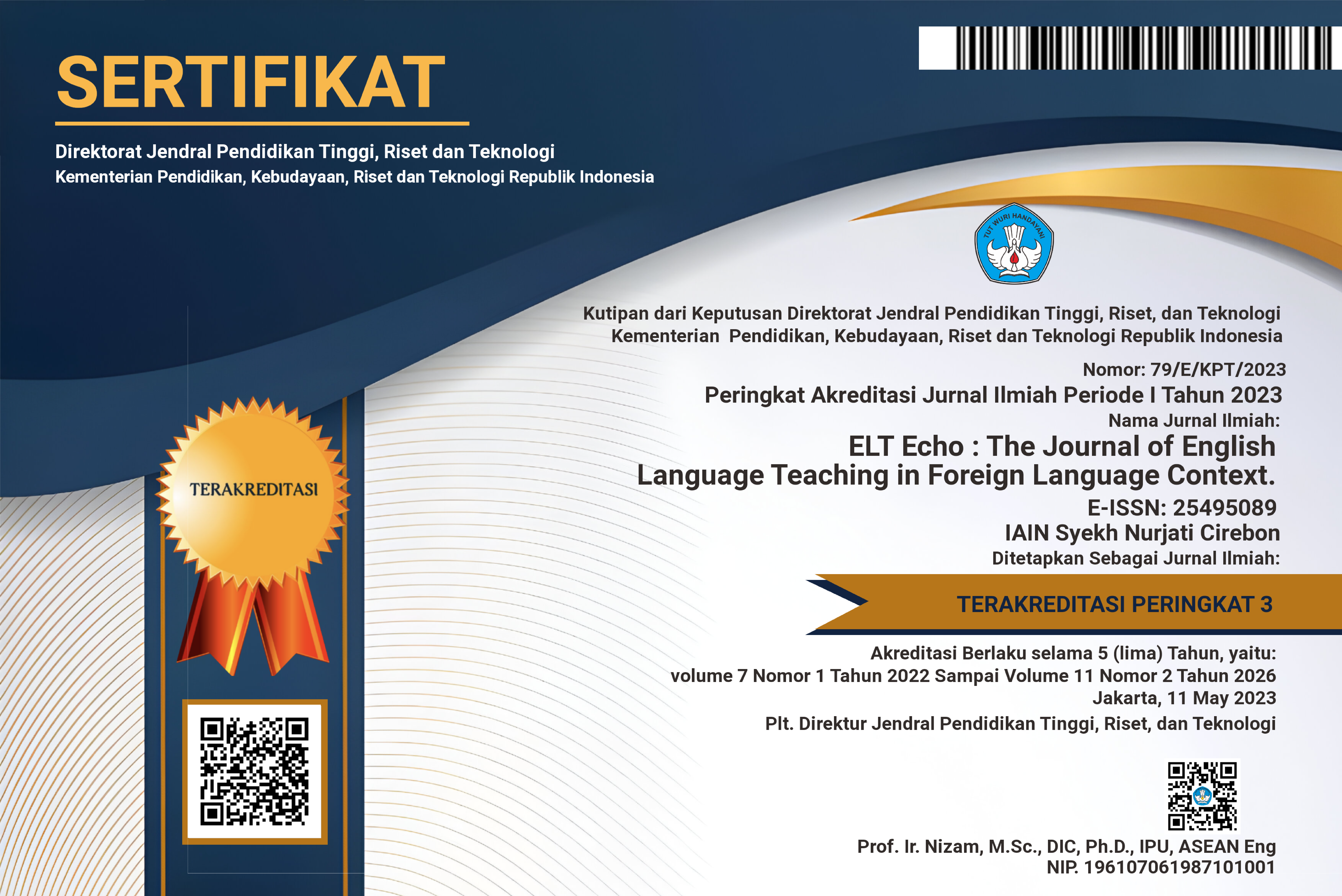MOTIVATIONAL FACTORS INFLUENCING INDONESIAN STUDENTS IN UNDERTAKING A MASTER’S DEGREE
(1) Xavier Learning Community, Chiang Rai, Thailand
(2) Sanata Dharma University, Yogyakarta, Indonesia
(*) Corresponding Author
Abstract
Education is one of the necessities for cultivating people and the country. It cannot be separated from human life since it is considered as a life-long learning process without limitation. Students have different reasons, factors, and motivations to study a Master’s Degree. This study aimed at investigating motivational factors that impact Indonesian students to undertake a Master’s Degree in English Education. Mixed methods research design was employed to identify and understand the specific information focusing on students’ motivation. The data were collected through questionnaires and in-depth interviews. Graduate students studying in the first semester of the English Education Master’s Program at Sanata Dharma University, Yogyakarta, participated in this study. The obtained data were analyzed using descriptive statistics and displayed in the mean score and the level of motivation. The findings indicated that, in general, students were intrinsically motivated in embarking on their Master’s Degree (m=3.99), with a high level of intrinsic motivation. The data from the interviews revealed that at least three motivational factors were influencing students in pursuing a Master’s Degree, namely personal, environmental, and profession-oriented factors. This study provides suggestions for future research.
Keywords
Full Text:
PDFReferences
Acharya, B. (2010, June). Questionnaire design. In a paper prepared for a training workshop in research methodology organized by centre for post graduate studies Nepal engineering college in collaboration with university Grant Commission Nepal, Pulchok, June (pp. 2-11).
Akhtar, S. N., Iqbal, M., & Tatlah, I. A. (2017). Relationship between intrinsic motivation and students’ academic achievement: A secondary level evidence. Bulletin of Education and Research, 39(2), 19–29.
Angelianawati, L. (2018). Higher education teaching strategies: An overview of English classes. Jurnal Dinamika Pendidikan, 11(2), 183. https://doi.org/10.33541/jdp.v11i2.814
Arar, K., & Abramowitz, R. (2017). Motivation and choice of teachers to pursue their post-graduate studies in an ethnic minority college. Journal of Applied Research in Higher Education, 9(4), 616–629. https://doi.org/10.1108/JARHE-03-2017-0020
Arceňo, R. A. (2018). Motivations and expectations of graduate students of the college of advanced education (CAEd). PEOPLE: International Journal of Social Sciences, 4(1), 239–256. https://doi.org/10.20319/pijss.2018.41.239256
Bernaus, M., Wilson, A., & Gardner, R. C. (2009). Teachers’ motivation, classroom strategy use, students’ motivation and second language achievement. Porta Linguarum, (12), 25–36.
Chalak, A., & Kassaian, Z. (2010). Motivation and attitudes of Iranian undergraduate EFL students. GEMA Online Journal of Language Studies, 10(October 2016), 37–56.
Connor, C. O. (2012). Motivations surrounding the pursuit of post-graduate study. 17.
Cortese, A. D. (2003). The critical role of higher education in creating a sustainable future. Planning for higher education, 31(3), 15-22.
Dakhi, S., & Damanik, I. S. (2018). Students’ motivation in reading English text: A qualitative study in EFL context. JET (Journal of English Teaching), 4(2), 81. https://doi.org/10.33541/jet.v4i2.832
Deci, E. L. (1971). Effects of externally mediated rewards on intrinsic motivation. Journal of personality and Social Psychology, 18(1), 105.
Dörnyei, Z. (1998). Motivation in second and foreign language learning. Language Teaching, 31(3), 117–135. https://doi.org/10.1017/S026144480001315X
Dörnyei, Z. (2005). The psychology of the language learner. 66.
Durso, S. D. O., Da Cunha, J. V. A., Neves, P. A., & Teixeira, J. D. V. (2016). Motivational factors for the master’s degree: A comparison between students in accounting and economics in the light of the self-determination theory. Revista Contabilidade e Financas, 27(71), 243–258. https://doi.org/10.1590/1808-057x201602080
Fan, W., & Wolters, C. A. (2014). School motivation and high school dropout : The mediating role of educational expectation. 22–39. https://doi.org/10.1111/bjep.12002
Forza, C. (2002). Survey research in operations management: A process-based perspective. International Journal of Operations and Production Management, 22(2), 152–194. https://doi.org/10.1108/01443570210414310
Gardner, R. C., & Lambert, W. E. (1959). Motivational variables in second-language acquisition. Canadian Journal of Psychology/Revue canadienne de psychologie, 13(4), 266.
Ghenghesh, P. (2010). The motivation of learners of Arabic: Does it decrease with age? Journal of Language Teaching and Research, 1(3), 128–141. https://doi.org/10.4304/jltr.1.3.235-249
Gunawan, Y. B. (2016). English learning that fosters positive attitudes. LLT Journal: A Journal on Language and Language Teaching, 17(1), 35-41.
Kusumawati, A., Yanamandram, V., & Perera, N. (2010). University marketing and consumer behaviour concerns : The shifting preference of university selection criteria in Indonesia. Biennial Conference of the Asian Studies Association of Australia in Adelaide, 5, 1–16.
Lamb, M. (2004). Integrative motivation in a globalizing world. System, 32(1), 3-19.
Macintyre, P. D., & Vincze, L. (2017). Positive and negative emotions underlie motivation for L2 learning. Studies in Second Language Learning and Teaching, 7(1), 61–88. https://doi.org/10.14746/ssllt.2017.7.1.4
Mbato, C. L. (2013). Facilitating EFL learners’ self-regulation in reading : Implementing a metacognitive approach in an Indonesian higher education context. 1–252.
Miao Yee Clare, C., Renandya, W. A., & Qiu Rong, N. (2019). Demotivation in L2 classrooms: Teacher and learner factors. LEARN Journal: Language Education and Acquisition Research Network, 12(2), 64–75.
Nailufar, Y. (2018). Analysis of Motivations to study English and Arabic. English Education Journal, 9(2), 328-345.
Ncube, T. R., & Zondo, R. W. D. (2018). Influence of self-motivation and intrinsic motivational factors for small and medium business growth: A South African case study. South African Journal of Economic and Management Sciences, 21(1), 1–7. https://doi.org/10.4102/sajems.v21i1.1994
Odanga, S. (2018). Strategies for increasing students’ self-motivation. Asian Research Journal of Arts & Social Sciences, 6(4), 1–16. https://doi.org/10.9734/arjass/2018/41354
Rotter, J. B. (1966). Generalized expectancies for internal versus external control of reinforcement. Psychological monographs: General and applied, 80(1), 1.
Salmi, J. (2009). The challenge of establishing world class universities. The World Bank.
Sharma, D., & Sharma, S. (2018). International journal of advances in scientific research relationship between motivation and academic achievement QR Code *Correspondence Info. International Journal of Advances in Scientific Research, 4(1), 1–5. https://doi.org/10.7439/ijasr
Suryasa, I. W., Prayoga, I. G. P. A., & Werdistira, I. W. A. (2017). An analysis of students motivation toward English learning as second language among students in Pritchard English academy (PEACE). International Journal of Social Sciences and Humanities, 1(2), 43–50. https://doi.org/10.29332/ijssh.v1n2.36
Uka, A. (2012). Motivational factors of albanian graduate students pursuing a master degree in education. Beder University Journal of Educational Sciences, 15–23.
Vibulphol, J. (2016). Students’ motivation and learning and teachers’ motivational strategies in English classrooms in Thailand. English Language Teaching, 9(4), 64. https://doi.org/10.5539/elt.v9n4p64
Werang, B. R. (2018). Investigating students ’ learning motivation in Indonesian higher institution : A study from Musamus University of Merauke , Papua. (April).
Willy A. Renandya. (2015). L2 motivation: Whose responsibility is it? English Language Teaching, 27(4), 177–189. https://doi.org/10.17936/pkelt.2015.27.4.009
Workman, B. A. (2011). Extending and embedding work-based learning across the university: Change strategies in action. Higher Education, Skills and Work-Based Learning, 1(2), 106–117. https://doi.org/10.1108/20423891111128881
Yousapronpaiboon, K. (2014). SERVQUAL: Measuring higher education service quality in Thailand. Procedia - Social and Behavioral Sciences, 116, 1088–1095. https://doi.org/10.1016/j.sbspro.2014.01.350
DOI: 10.24235/eltecho.v5i1.6482
Article Metrics
Abstract view : 145 timesPDF - 27 times
Refbacks
- There are currently no refbacks.
Â
This Journal is indexed by:
Â

This work is licensed under a Creative Commons Attribution 4.0 International License.










